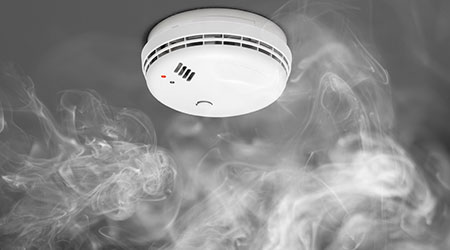Question: Are smoke alarms in bedrooms necessary in a grandfathered situation, such as:
- Non-sprinkled healthcare facility, except domestic water fed sprinklers in mechanical, boiler and storage rooms
- Will house ambulatory, overnight drug rehab patients
- With unlocked doors to the outside and if needed.
- Do they need to be tied in to the pre-existing fire alarm system that is already in the hallways?
Answer from Brad Keyes: The question doesn’t state if it’s a hospital or a nursing home or if it’s new construction or existing construction. Also, the writer did not clarify if the sleep rooms are for staff or patients. All of that does make a difference.
If you are a hospital…
Then there is no requirement to have smoke detectors (or smoke alarms) in patient sleeping rooms. However, there is a requirement to have single station smoke alarms in staff sleeping rooms. Section 9.6.2.10.1.4 of the 2012 LSC does permit a smoke detector connected to the building fire alarm system in lieu of a single station smoke alarm, but it would still need to have the capability to notify the occupants in the case of an alarm.
If you are an existing nursing home…
Section 19.3.4.5.1 of the 2012 LSC does require smoke detectors in corridors unless there are smoke detectors in the patient’s sleeping rooms, or unless the smoke compartment is fully protected with sprinklers (which is required by CMS at this time).
If you are a new construction nursing home…
Section 18.3.4.5.1 of the 2012 LSC does require smoke detectors in corridors unless there are smoke detectors in the patient’s sleeping rooms, or unless the patient room doors are equipped with automatic closing devices with integral smoke detectors on the room side and the smoke detectors provide occupant notification.
There is no “grandfathering” in the Life Safety Code. There are “existing” occupancy chapters that all healthcare facilities constructed prior to July 5, 2016, are expected to comply with, but it is not the same as saying it is “grandfathered.” The existing occupancy chapter for healthcare does change from edition to edition.
Brad Keyes, CHSP, is the owner of KEYES Life Safety Compliance, and his expertise is in the management of the Life Safety Program, including the Environment of Care and Emergency Management programs.

 Healthcare and Resilience: A Pledge for Change
Healthcare and Resilience: A Pledge for Change Texas Health Resources Announces New Hospital for North McKinney
Texas Health Resources Announces New Hospital for North McKinney Cedar Point Health Falls Victim to Data Breach
Cedar Point Health Falls Victim to Data Breach Fire Protection in Healthcare: Why Active and Passive Systems Must Work as One
Fire Protection in Healthcare: Why Active and Passive Systems Must Work as One Cleveland Clinic Hits Key Milestones for Palm Beach County Expansion
Cleveland Clinic Hits Key Milestones for Palm Beach County Expansion